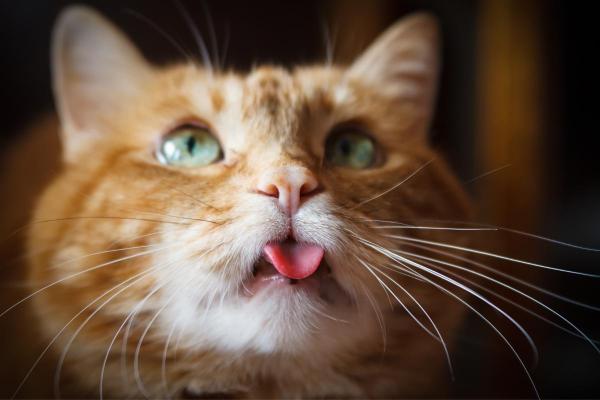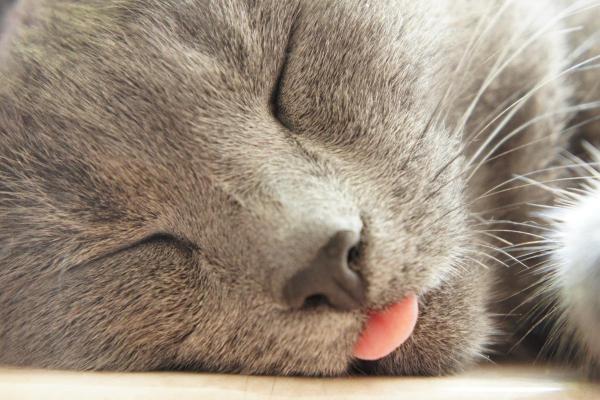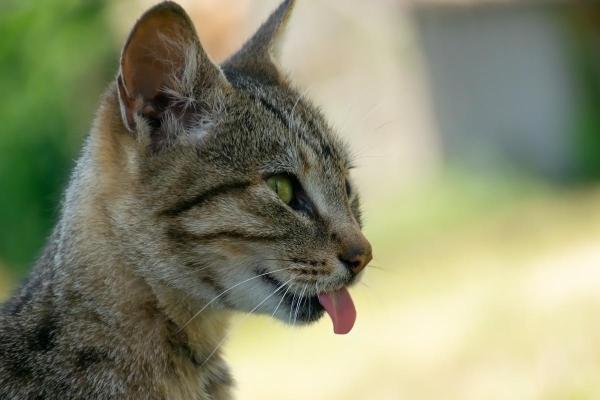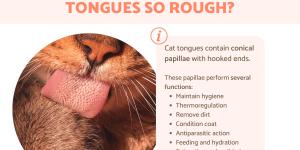My Cat Is Sticking Their Tongue Out



See files for Cats
A cat sticking out their tongue can be a curious behavior which is often caught on video for memes. It gives the cat a strange appearance which can mimic similar human gestures. Although this can be funny to us, any behavior which is out of the ordinary for a cat must be understood in context. While most of the reasons why a cat sticks out their tongue are either part of their feline nature or otherwise benign, there are a few instances when this might be a sign of a health issue.
At AnimalWised, we look at the reasons why my cat is sticking their tongue out. We look at the different contexts of this behavior so you can determine whether it is a normal behavior or a sign of a problem.
For relaxation
Perhaps the most common reason why a cat sticks out their tongue is a sign of relaxation. When a cat is very tired after an exhaustive play session or simply settling down for a nap, they will carry out many behaviors. They will squint their eyes, rub up against you and start purring. In this state of deep relaxation, their body muscles will also relax, including their jaw. When this happens, their tongue may protrude a little from their mouth.
When a they do this in your company, it is a clear sign your cat trusts you. Sticking their tongue out due to relaxation means they feel comfortable in your presence and want to be near the person that makes them feel safe.

Flehmen response
One of the most idiosyncratic behaviors of cats is a behavior known as the flehmen response. This is an instinctive behavior in various mammal species which can seem quite peculiar. It is common reason we see cat sticking their tongue out memes. They retract their lips, close their eyes and stick their tongue out, often while moving their head around slowly. Essentially, the cat opens their mouth wide when sniffing.
The purpose of the flehmen response is to do with their acute sense of smell. Cats have pheromone receptors in an auxiliary sense organ known as the vomeronasal organ or Jacobson's organ. Located at the back of the hard palate, opening up their mouth and sticking out their tongue allows the cat better ability to capture a scent to be received by this organ. This provides important information about other cats such as whether they are in heat.
Behavioral conditioning
As their guardian, we are likely our cat's main point of reference. Cats look to us for security, but they also learn behaviors from us. They do so thanks to repetition, association and positive reinforcement. If a cat sticks their tongue out and we smile at them or provide some other positive reaction, they may internalize the behavior with the response. For this reason, cats may stick out their tongue as a form of behavioral conditioning.
While a cat sticking out their tongue in this way is not a problem in itself, it is important to pay attention if our cat regularly petitions us for something. It doesn't necessarily mean the cat is needy. It may be a sign there is something missing in their lives and they want you to provide it. This is a good opportunity to assess their needs and address anything that may be lacking in their routine.

Oral health problems
As we have stated, cats sticking out their tongue doesn't necessarily mean there is a problem. However, it is very important we do consider a health issue to be a possibility. One possible reason is an oral health problem. If a cat breaks or loses a canine tooth, it is possible their tongue will protrude out of their mouth.
Dental health problems in cats can be due to a variety of issues. These include gum diseases such as periodontitis or gingivostomatitis in cats[1]. These can be very uncomfortable for the cat. Even if they have not lost a tooth, such problems can result in the cat sticking their tongue out to relieve pain or discomfort. If you think your cat has a dental health problem, you will need to speak to a veterinarian immediately.
Most oral health problems in cats are very treatable, but early intervention is important for a good prognosis. For this reason, we should ensure we provide regular checkups for our cat. The veterinarian can assess for serious problems such as oral tumors. These are relatively rare, but can be fatal if left untreated.
Other health problems
In addition to oral health issues, there are other diseases and ailments which can result in your cat sticking out their tongue. These can be both physical or psychological. Some of the most important include the following:
- Heatstroke: when a cat is overheated, they will stick their tongue out to cool down. Heatstroke in cats is a serious case of overheating. It can result in dehydration and shock, being fatal in extreme cases[2].
- Respiratory distress: whether due to a respiratory illness or as a secondary response to another disease, labored breathing in cats can cause them to stick out their tongue.
- Poisoning: when a cat ingests something toxic, it can result in them going into shock. Their body will stop functioning properly and they may stick their tongue out as a sign their organism is collapsing. Immediate veterinary intervention is essential.
- Infections: whether viral, bacterial or fungal, various infections can also cause the cat's body to shut down. As their immune system tries to fight the infection, various symptoms will develop. Sticking out their tongue is one which implies the infection has progressed seriously.
- Parasites: a parasitosis is the term for an infection or infestation of parasites in cats which becomes a disease. There are various symptoms of parasitosis such as scratching or weight loss, but sticking out their tongue occurs when this disease has progressed significantly.
- Allergies: cats can have allergies to various allergens in their environment. When an allergic reaction is severe, it can result in anaphylactic shock in cats which causes them to stick their tongue out.
- Neurological disorders: this is common in older cats which suffer from neurodegeneration due to advanced age. Other types of neurological disorders in cats can result in sticking out the tongue which can occur at any age. This includes epilepsy which can cause seizures.
- Stress: when a cat is very stressed or anxious, they can respond with various physical and behavioral signs. Sticking out their tongue might be due to the cat being so acutely stressed that they lose control of themselves. This means they are in an advanced state of stress.
When a cat sticks their tongue out, it is important to differentiate this as a genuine symptom of disease or as a natural response to normal behaviors. For example, if a cat is hot, they will stick out their tongue to cool down. This doesn't necessarily mean they have heatstroke, but we should ensure we are able to keep the cat cool. Another reason might be if the cat is panting after they have engaged in strenuous exercise.
There is a hair on their tongue
A cat's tongue is rough for a very important reason. Hooked papillae on the tongue act like a hairbrush. The domestic feline is a very hygienic animal. They will groom themselves for long periods to remove dirt and dead hair. They will also groom other animals and even people if they consider them part of their family. It also allows them to help cool down since the evaporating saliva on their coat helps to lower body temperature.
Since the cat spends so much time grooming, it should be no surprise hair can get stuck on their tongue. They will often ingest hair, something which risks the development of hairballs in cats. If it does not get ingested, it is possible the hair will stick to the tongue. Since the papillae are hooked, the hair can get stuck on the tongue and tickle the throat. The cat will stick the tongue out to try to hack the hair out of their mouth.
My cat is sticking out their tongue while sleeping
You may have noticed a contented cat sleeping with their tongue sticking out. We have already explained that a cat will stick their tongue out when they are very relaxed. Especially when it is in deep REM mode, sleep is a state of extreme relaxation. If a cat sticks their tongue out while sleeping, it is usually because they are simply resting peacefully.
When a kitten sticks their tongue out while sleeping, it is possible they are teething. This occurs when the kitten loses their baby teeth and their adult teeth grow in. Sticking their tongue out may help ease this process. You will likely see the kitten drool more and will gnaw on everything when they are awake.
How a cat sleeps can help us learn a lot about their health and wellbeing. Learn more with our article on a cat's sleep positions and their meanings.

What to do when a cat keeps sticking out their tongue
As you can see, cats sticking out their tongue is often a benign behavior which is simply related to their feline instinct. It is a natural behavior which does not require intervention. If they are sticking out their tongue while sleeping, after exercise or when they are smelling something in the air, interrupting them will likely cause more harm than good. Preventing a cat from carrying out their routine will have negative consequences over time.
When a cat keeps sticking out their tongue, we need to look at the context of the behavior. If they are showing other signs of illness such as fatigue, losing hair or even gastrointestinal symptoms, we need to take them to a veterinarian. Neglecting their hygiene is a particularly worrying symptom. It is likely their health is very compromised, whether physical or mental. If you think stress may be a factor, speak to your vet about consulting a feline ethologist.
If several of these signs occur, you should take him to the veterinarian to examine him so that the situation does not worsen or worsen. The frequency with which the cat sticks out their tongue is a key factor in determining whether the cat's health and well-being are under threat.

If you want to read similar articles to My Cat Is Sticking Their Tongue Out, we recommend you visit our Facts about the animal kingdom category.
1. Álvarez Bueno, R. (2021). Feline ethology: Basic guide to cat behavior. Amazing Books.
2. Amat, M., Camps, T., & Le Brech, S. (2017). Practical manual of clinical ethology in cats. Multimédica Veterinary Editions, first edition.
- Parasites: professional advice. (n.d.). Ateuves 73, p. 17. Retrievdd from: https://ateuves.es/revista-online/ateuves_73.html
- Sugimoto, K., Kawase, N., Aoki, T., & Fujii, Y. (2019). Effects of dehydration on echocardiographic diastolic parameters in healthy cats. Journal of veterinary science, 20(3), e18. https://doi.org/10.4142/jvs.2019.20.e18








